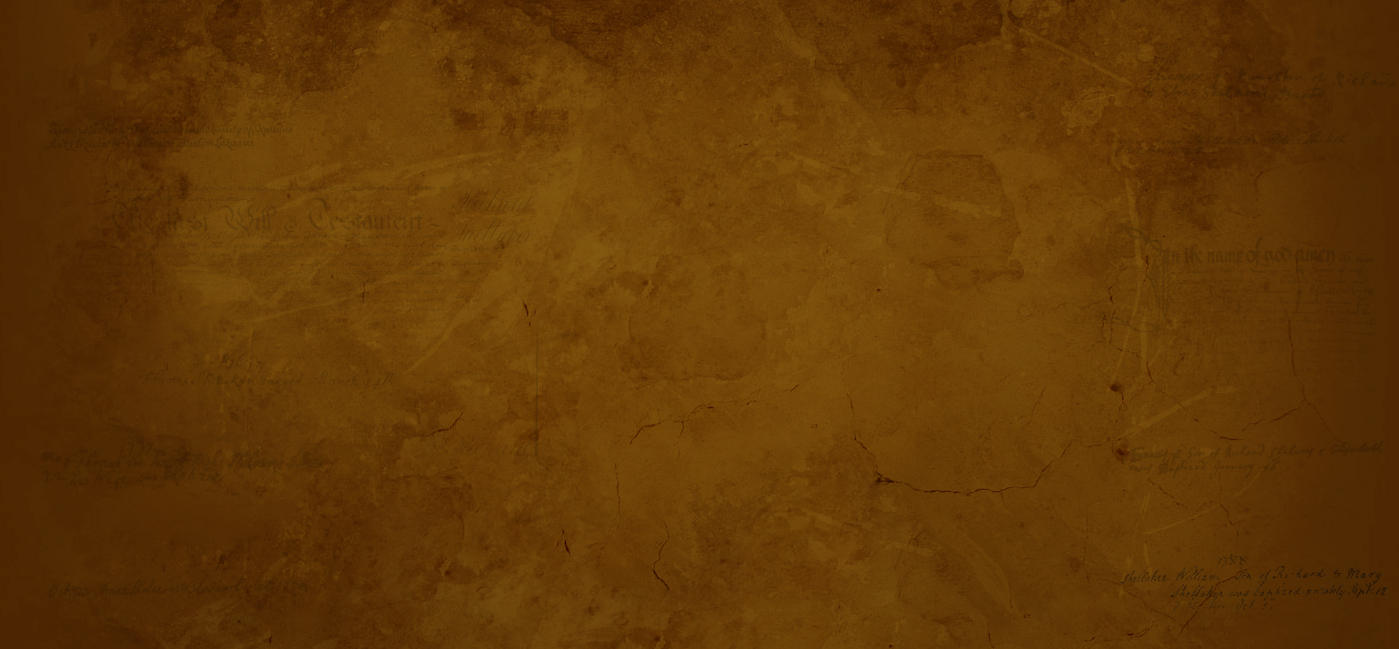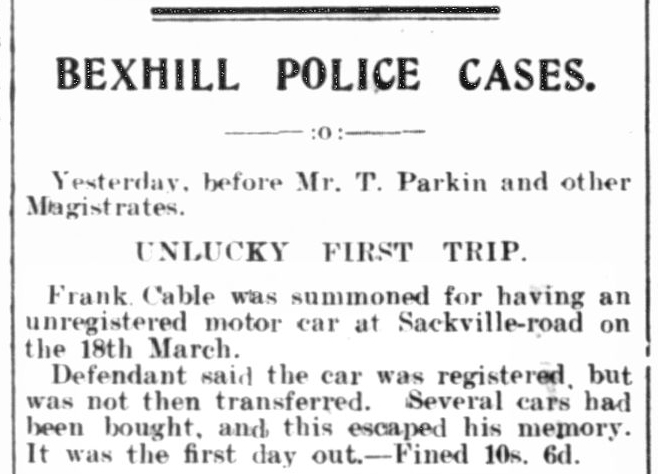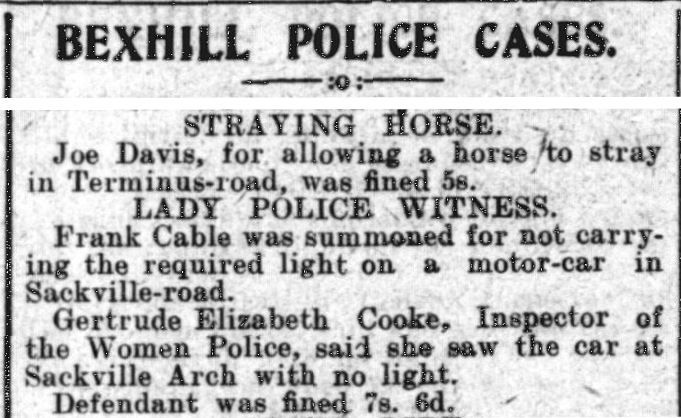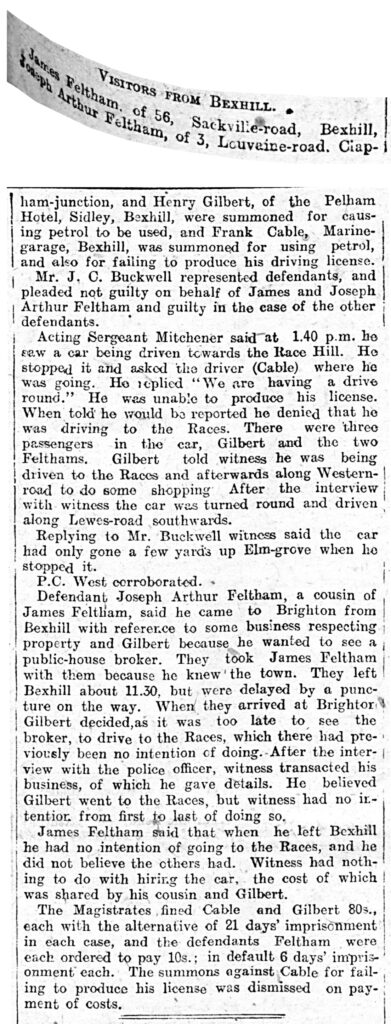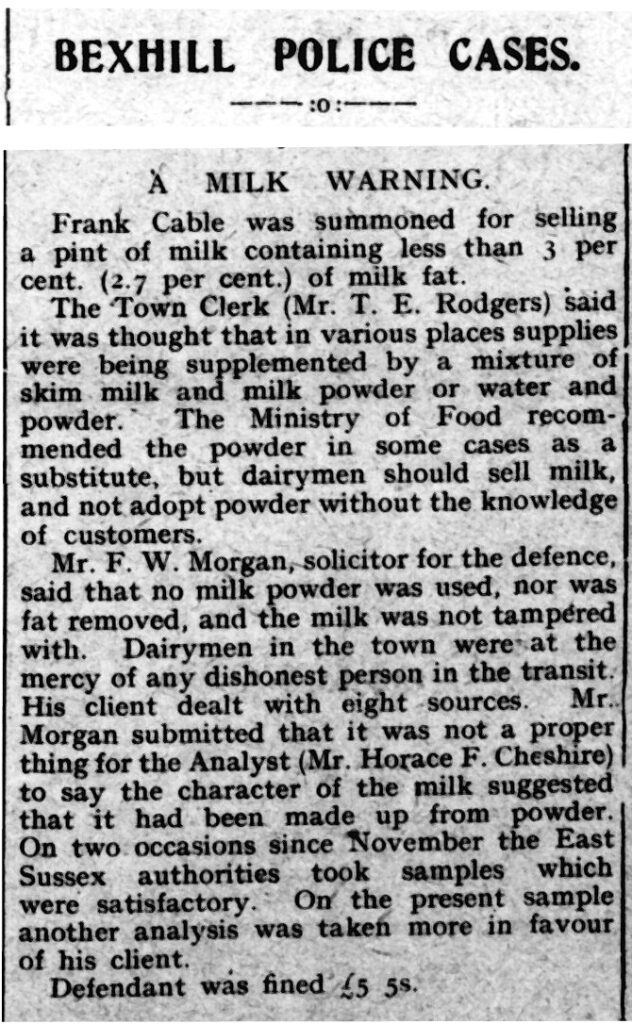CHAPTER V
Frank Harry Cable faces the Magistrates on numerous occasions
1915 – NOVEMBER: DRIVING OFFENCES
Around a week after the incident in September was reported in the newspaper on November 13th Frank Cable appeared again in another publication. On this occasion in the ‘Wimbledon Boro News’ on Saturday November 20, 1915, for two driving offences
NB – Wimbledon is around 60 miles from Bexhill and is a suburb in the south west of London.
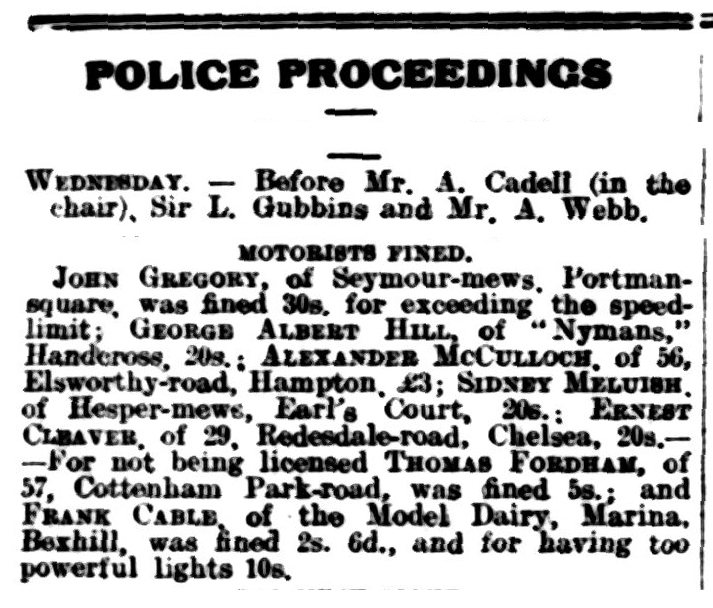
POLICE PROCEEDINGS
Wednesday. – Before Mr. A. Cadell (in the chair), Sir L. Gubbins and Mr. A. Webb.
MOTORISTS FINED
(It is the final entry of those not being licensed)
FRANK CABLE, of the Model Dairy, Marina, Bexhill, was fined 2s. 6d., [for not being licensed] and for having too powerful lights 10s.
REVIEWED
1916 – APRIL: ANOTHER DRIVING OFFENCE FOR FRANK
Back in September, the previous year, Frank Harry Cable was fined for driving a car that was unlicensed while in Wimbledon. However, around 4 months later, Frank was in front of the Magistrates again facing a similar offence, but on occasion, back in his home town of Bexhill.
Bexhill on Sea Observer, Saturday, April 1, 1916
BEXHILL POLICE CASES.
Yesterday, before Mr. T. Parkin and other Magistrates.
UNLUCKY FIRST TRIP
Frank Cable was summoned for having an unregistered motor car at Sackville-Road on the 18th March.
Defendant said the car was registered, but had not been transferred. Several cars had been bought, and this had escaped his memory. It was the first day out. – Fined 10s. 6d.
REVIEWED
1917– JUNE: AND YET ANOTHER DRIVING OFENCE FOR FRANK
Just over a year after the previous occasion, Frank Harry Cable faced the magistrates for another motoring offence, as before, it was on Sackville-Road in Bexhill, however, this incident related to driving without lights.
Bexhill on Sea Observer, Saturday, June 30, 1917
BEXHILL POLICE CASES
STRAYING HORSES
Joe Davies, for allowing a horse to stray in Terminus Road, was fined 5s.
LADY POLICE WITNESS
Frank Cable was summoned for not carrying the required light on a motor car in Sackville-road. Gertrude Elizabeth Cook, Inspector of the Women Police, said she saw the car at Sackville Arch with no light. Defendant was fined 7s. 6d.
REVIEWED
The photograph above left show Sackville-Road and illustrates the types of motor car around the time of Frank’s offence and on the right, I believe is the Sackville Arch, where Frank Harry Cable was seen driving without lights.
Click on the image to view a larger picture.
1917– SEPTEMBER: A DAY AT THE RACES PROVES COSTLY
Frank Harry Cable was the driver of a motor car, which contained three others. He was stopped by the police for ‘causing petrol to be used’ (see Footnote below). He was also subsequently charged with ‘failing to produce his driving license’. Interestingly two of those in the vehicle had the surname of ‘Feltham‘ (his mother’s maiden name), James and Joseph Arthur Feltham. I believe James Feltnam was Frank Cable’s half-brother, who was born in 1972, and as stated in the newspaper, Joseph Arthur Feltham, was a cousin of James. At the time of this incident Frank Cable was 36 years old.
This article indicates Frank Cable gave to the police and the magistrates, as his address, the Marine garage in Bexhill but it appears he still owned the Model Dairy at this time.
Sussex Daily News, Tuesday, 25 September, 1917
VISITORS FROM BEXHILL
James Feltham, of 56, Sackville-road, Bexhill, Joseph Arthur Feltham, of 3, Louvaine-road, Clapham-junction, and Henry Gilbert, of the Pelham Hotel, Sidley, Bexhill, were summoned for causing petrol to be used, and Frank Cable, Marine-garage, Bexhill, was summoned for using petrol, and also for failing to produce his driving license.
Mr. J.C. Buckwell represented defendants, and pleaded not guilty on behalf of James and Joseph Arthur Feltham and guilty in the case of the other defendants.
Acting Sergeant Mitchener said at 1.40 p.m. he saw a car being driven towards Race Hill. He stopped it and asked the driver (Cable) where he was going. He replied “We are having a drive round”. He was unable to produce his license. When told he would be reported he denied that he was driving to the Races. There were three passengers in the car, Gilbert and the two Felthams. Gilbert told witness he was being driven to the Races and afterwards along Western-road to do some shopping. After the interview with witness the car turned round and driven along Lewis-road southwards.
Replying to Mr. Buckwell witness said the car had only gone a few yards of Elm-grove when he stopped it.
P.C. West collaborated.
Defendant Joseph Arthur Feltham, a cousin of James Feltham, said he came to Brighton from Bexhill with reference to some business respecting property and Gilbert because he wanted to see a public-house broker. They took James Feltham with them because he knew the town. They left Bexhill at around 11.30, but were delayed by a puncture on the way. When they arrived at Brighton Gilbert decided, it was too late to see the broker, to drive to the Races, which they had previously no intention of doing. After the interview with the police officer, witness transacted his business, of which he gave details. He believed Gilbert went to the Races, but witness had no intention, from first to last of doing so.
James Feltham said when he left Bexhill he had no intention of going to the Races, and he did not believe the others had. Witness had nothing to do with hiring the car, the cost of which was shared by his cousin and Gilbert.
The Magistrates fined Cable and Gilbert 80s., each with the alternative of 21 days’ imprisonment in each case, and the defendants Feltham were each order to pay 10s.; in default 6 days’ imprisonment each. The summons against Cable for failing to produce his license was dismissed on payment of costs.
REVIEWED
FOOTNOTE: This incident took place during the First World War, known at that time as ‘ The Great War’ (1914 – 1918), at which time civilian petrol usage in the UK was severely restricted due to petrol shortages with the priority given to military needs. Petrol rationing was introduced in July 1916 to manage the dwindling supplies, and tax on fuel doubled. Due to the need to ensure fuel was available for critical military uses, private car ownership was increasingly viewed as an unpatriotic luxury.
MARINA GARAGE
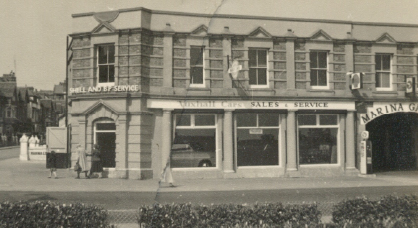 The Marina Garage, the address given by Frank Cable to the police in September 1917 was constructed in 1913 and occupied by the “Bexhill MotorCompany”.
The Marina Garage, the address given by Frank Cable to the police in September 1917 was constructed in 1913 and occupied by the “Bexhill MotorCompany”.
In 1915 it was purchased by Herbert Pulham who already had premises at 27, Sackville Road, which he sold in 1919.
The garage closed in 1972, and the site cleared for redevelopment, but this didn’t take place until some afterwards; Marina Court now occupies the site. [Ref: Bexhill Museum]
The photograph on the right, shows the Marina Garage most likely taken in the 1950s.
1917– NOVEMBER: OVERCHARGING FOR BUTTER DURING WARTIME
Frank Cable appeared before the magistrates again but on this occasion not for a motoring offence but for selling butter, during The Great War (World War I) above the price imposed by the local Food Control Committee.
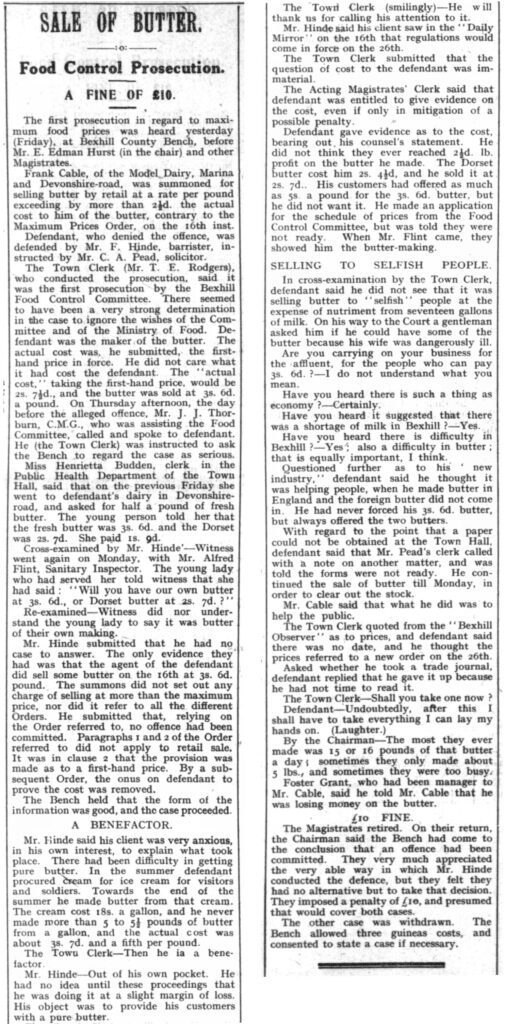 BEXHILL-ON-SEA OBSERVER, SATURDAY, NOVEMBER 24, 1917.
BEXHILL-ON-SEA OBSERVER, SATURDAY, NOVEMBER 24, 1917.
SALE OF BUTTER.
Food Control Prosecution.
A FINE OF £10.
The first prosecution in regard to maximum food prices was held yesterday (Friday) at Bexhill County Bench, before Mr. E. Edmund Hurst (in the chair) and other Magistrates. Frank Cable, of the Model Dairy, Marina and Devonshire-road, was summoned for selling butter by retail at a rate per pound exceeding by more than 2½d. the actual cost to him of the butter, contray to the Maximum Price Order, on the 16th inst.
Defendant, who denied the offence, was defended by Mr. F. Hinde, barrister, instructed by Mr. C.A.P. Pead, solicitor. The Town Clerk (Mr. T.E. Rogers), who conducted the prosecution, said it was the first prosecution by the Bexhill Food Control Committee. There seemed to have been a very strong determination in the case to ignore the wishes of the Committee and the Ministry of Food. Defendant was the maker of the butter. The actual cost was, he submitted, the first-hand price in force. He did not care what it cost the defendant. The “actual cost,” taking the first-hand price would be 2s 7½d. and the butter was sold at 3s. 6d. a pound. On Thursday afternoon, the day before the alleged offence, Mr. J.J. Thornburn, G.M.G., who assisting the Food Committee, called and spoke to the defendant. He (the Town Clerk) was instructed to ask the Bench to regard the case as serious.
Miss Henrietta Burden, clerk of the Public Health Department of the Town Hall, said that on the previous Friday she went to the defendant’s dairy in Devonshire-road, and asked for half a pound of fresh butter. The young person told her that the fresh butter was 3s.6d. and the Dorset was 2s. 7d. She paid 1s. 9d. Cross-examination by Mr. Hinde’ – Witness went again on Monday, with Mr. Alfred Flint, Sanitary Inspector. The young lady who served the food served her told witness that she had said: “Will you have our own butter at 3s. 6d. or Dorset butter at 2s. 7d.?” Re-examined – Witness did not understand the young lady to say that it was butter of their own making.
Mr. Hinde submitted that he had no case to answer. The only evidence they had was that the agent of the defendant did sell some butter on the 16th at 3s. 6d. The summons did not set out any charge for the selling at more than the maximum price, nor did it refer to all the different Orders. He submitted that, relying on the Order referred to, no offence had been committed. Paragraphs 1 and 2 of the Order referred to did not apply to retail sale. It was a clause 2 that the provision was made as a first-hand price. By subsequent Order, the Onus was on the defendant to prove the cost was removed.
The Bench held that the form of the information was good, and the case proceeded.
A BENEFACTOR.
Mr. Hinde said his client was very anxious, in his own interest, to explain what took place. There had been difficulty getting pure butter. In the summer defendant procured cream for ice cream for visitors and soldiers. Towards the end of the summer he made butter from that cream. The cream cost 18s. a gallon, but he never made more than 5 to 5½ pounds of butter from a gallon, and the actual cost was about 3s. 7d. and a fifth per pound.The Town Clerk – Then he had been a benefactor. Mr. Hinde – Out of his own pocket. He had no idea until the proceedings that he was doing it a slight margin of loss. His object was to provide his customers with pure butter. The Town Clerk (smilingly) – He will thank us for calling his attention to it. Mr. Hinde said his client saw in the “Daily Mirror” on the 16th that regulations would come into force on the 26th. The Town Clerk submitted that the question of cost of defended was immaterial. The Acting Magistrates’ Clerk said that the defendant was entitled to give evidence on the cost, even if in mitigation of a possible penalty. Defendant gave evidence to as to the cost, bearing out his council’s statement. He did not think they had ever reached 2½d. pound profit on the butter he made. The Dorset butter cost him 2s 4½d. and he sold it at 2s. 7d.. His customers had offered as much as 5s a pound for the 3s. 6d. butter, but he did not want it. He made an application for the schedule of prices from the Food Control Committee, but was told they were not ready. When Mr Flint came, they showed him the butter-making.
SELLING TO SELFISH PEOPLE.
In cross-examination by the Town Clerk, defendant said he did not see that it was selling butter to the “selfish” people at the expense of nutriment from seventeen gallons of milk. On the way to the Court a gentleman asked him if you could have some of butter because his wife was dangerously ill. Are you carrying on your business for the affluent, for the people who can pay you 3d. 6d.?– I do not understand what you mean. Have you heard here is such thing as economy? – Certainly. Have you heard it suggested there is a shortage of milk in Bexhill? – Yes. Have you heard there is difficulty in Bexhill? – Yes; also difficulty in butter; is that equally important, I think. Questioned further as to his new ‘industry’, defendant thought it was helping people, when the butter was made in England and the foreign butter did not come in. He never forced his 3s. 6d. butter but he always offered the two butters.With regard to the point that the paper could not be obtained at the Town Hall, defendant said that Mr. Pead‘s clerk called with a note on another matter, and was told the forms were not ready. He continued the sale of the butter till Monday, in order to clear out the stock. Mr. Cable said that what he did was to help the public. The Town Clerk quoted from the “Bexhill Observer” as to prices, and the defendant said there was no date, and he thought the price is referred to the new order on the 26th. Asked whether he took a trade journal, defendant replied he gave it up because he had not time to read it. The Town Clark – Shall you take one now? Defendant – Undoubtedly, after this, I may have to take everything I can lay my hands on. (Laughter.)
By the Chairman – The most they ever made was 15 or 16 pounds of the butter a day; sometimes they only made about 5 lb., and sometimes they were too busy. Foster Grant, who had been manager to Mr. Cable, said that he told Mr. Cable that he was losing money on the butter.
£10 FINE.
The Magistrates retired. On their return, the Chairman said that the Bench had come to the conclusion that an offence had been committed. They were very appreciative in the way that Mr. Hinde conducted the defence, but they felt there had no alternative but to make that decision. They imposed a penalty of £10, and presumed that would cover both cases. The other case was withdrawn. The Bench allowed three guineas costs, and consented to state a case if necessary.
REVIEWED
FOO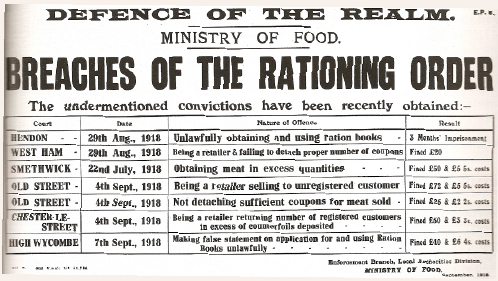 TNOTE: During The Great War (WW1) in the UK, Local Food Control Committees were established by the Ministry of Food to manage food distribution and rationing at a local level.
TNOTE: During The Great War (WW1) in the UK, Local Food Control Committees were established by the Ministry of Food to manage food distribution and rationing at a local level.
They enforced food control orders, registered retailers and consumers, fixed food prices, and promoted food economy campaigns to counter food shortages caused by German blockades. The ships bringing food over to Britain from other countries were often bombed at sea by German U-Boats and never arrived. Additionally, a lot of Britain’s food produce was being sent to the soldiers fighting on the front line.
These committees played a vital role in administering the rationing of key items like sugar, meat, butter, and milk, using ration books to ensure fair shares for everyone and preventing panic and unrest in communities.
Each person received ration cards that they could use at specific stores. Rationing meant that every person had access to food – even in a time when food was scarce. The Government had to introduce harsh punishments for those who broke the rationing rules – including fines and even prison time. (Examples shown in the image on the right).
 1918 – KELLY’S DIRECTORY
1918 – KELLY’S DIRECTORY
Frank Cable is listed in Kelly’s Directory with a profession of ‘dairy’ at Devonshire Road.
1918 – APRIL: FRANK FACES THE MAGISTRATES AGAIN
On Saturday 4th April 1918 the Bexhill-on-Sea Observer reported that Frank Cable faced a summons for selling milk that had been watered down.
BEXHILL-ON-SEA OBSERVER, SATURDAY, APRIL 6, 1918.
BEXHILL POLICE CASES
A MILK WARNING
Frank Cable was summoned for selling a pint of milk containing less than 3 per cent (2.7 per cent) of milk fat.
The Town Clerk (Mr T. E. Rogers) said it was thought that various places supplies were being supplemented by a mixture of skim milk and milk powder or water and powder. The Ministry of Food recommended the powder in some cases as a substitute, but dairymen should sell milk, and not adopt powder without the knowledge of customers.
Mr F. W. Morgan, solicitor for the defence, so [said?] that no milk powder was used, nor was fat removed, and the milk was not tampered with. Dairymen in the town were at the mercy of any dishonest person in the transit. His client dealt with eight sources. Mr. Morgan submitted that it was not a proper thing for Analysis (Mr Horace F. Cheshire) to say the character of the milk suggested in had been made up from powder. On two occasions since November the East Sussex authorities took samples which were satisfactory. On the present sample another analysis was taken more in favour of his client.
The defendant was fined £5. 5s
REVIEWED
1918 – DECEMBER – CASE AGAINST FRANK CABLE POSPONED
On Friday 20th Frank Cable again faced charges of tampering with the milk he sells. However, as reported The Chronicle newspaper the following day, the case was postponed until the new year.
THE CHRONICLE, SATURDAY, DECEMBER 21, 1918
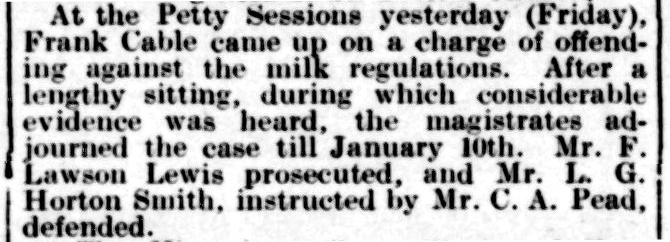 At the Petty Sessions yesterday (Friday), Frank Cable came upon a charge of offending against the milk regulations. After a lengthy sitting, during which considerable evidence was heard, the magistrates adjourned the case and until January 10th. Mr. F. Lawson Lewis prosecuted, and Mr. L.G. Horton Smith, instructed by Mr. C. A. Pead, defended.
At the Petty Sessions yesterday (Friday), Frank Cable came upon a charge of offending against the milk regulations. After a lengthy sitting, during which considerable evidence was heard, the magistrates adjourned the case and until January 10th. Mr. F. Lawson Lewis prosecuted, and Mr. L.G. Horton Smith, instructed by Mr. C. A. Pead, defended.
REVIEWED
1919 – JANUARY: FRANK CABLE FINED HEAVILY FOR MILK INFRINGEMENT
The case adjoined, just prior to Christmas, resumed in the middle of January and again, the quality of the mill supplied by Frank Cable was brought into question.
BEXHILL-ON-SEA OBSERVER, SATURDAY, JANUARY 18, 1919.
MILK AT COODEN CAMP.
DAIRYMAN HEAVILY FINE.
At Bexhill County Bench yesterday (Friday), before Mr. W.R. Dewing (in the chair), Mr. A.D. Snow, Alderman, J.A. Paton, Colonel C.H.W. Cafe, D.L., and Mr William Mannington, the hearing of the summons arising out of the supply of milk at the Canadian Convalescent Camp at Cooden was resumed. Frank Cable, a local dairyman, was summons for selling on the 16th November milk containing less than three per cent milk fat, (2.60), and 7.03 solids other than fat.
Mr. F. Lawson Lewis, solicitor, Eastbourne, represented the prosecution and Mr. Horton Smith barrister, instructed by Mr. C.A. Pead, solicitor, Bexhill, defended.
Defendant had supplied about 60 gallons a day in November to the Camp. A previous sample was found good. The defence in regard to this milk was that water got through an accident in the cooler, and that the milk was intended for pigs on a farm, where was eventually delivered.
At a previous hearing Mr. Horton Smith submitted that there was no delivery of milk at the Camp, and a sale had not taken place.
CASE FOR THE DEFENCE
Mr. Horton Smith now said the defendant had supplied Cooden Camp with milk for four years. On the evening before or the morning on which sample taken Mr. Cable’s motor broke down. He had a contract for the removal of garbage from the Camp. He had to use such transport as he could get. Mr. Shoesmith, junr., sent two cars to remove the garbage. Subsequently Mr. Cable and Mr. Shoesmith started. They did not notice the churn in Mr. Shoesmith’s van. They had not intended to go to the Camp, but some things were put in for the Officers’ mess.
The foreman put the churn on Mr. Shoesmith’s van would for the pigs after the accident to the cooler, assuming that Mr. Shoesmith’s van would go to the farm. The proper milk arrived in the Camp later in that day, as it has done on some previous occasions.
A “JOYRIDE”
Defendant said that the foreman had discretion in dealing with damaged or sour milk. Defendant did not think there was a written contract with the Camp at the particular time, but there was an arrangement to deliver milk.
He had had no complaints. He kept pigs jointly with Mr. Shoesmith. In November they were Woodgate Farm.
In consequence of the motor breakdown he arranged Mr. Shoesmith to take him to the Camp to instruct the man about collecting the garbage and clean the dustbins.
He did not notice what was in Mr. Shoesmith’s van. At the Camp Inspector Murphy said he would like a sample. Defendant said, “You may take a sample, but I don’t know anything about it whatsoever” and that he came to direct Mr. Shoesmith’s man about the garbage. When defendant saw the milk in the churn it was not strained.
When Inspector Murphy said “Go on, deliver the milk”, defendant reply that he did not deliver milk and he had no instructions.
Referring to the incident to the cooler, Mr. Lawson Lewis, in cross-examination, asked, “Did he (the foreman) keep it in a profound secret?” Defendant replied that the foreman did not see him then. Defendant was having his breakfast. The manager is away buying cigarettes when defended went out of the yard. Defendant did not notice the churn until Inspector Murphy came up.
Mr. Shoesmith was quite likely to have a churn of his own in the van. Two small cans of milk were for the Sergeants’ mess, but defendant did not know till he took them back to Bexhill.
Mr. Lawson Lewis – So you start out with the Churn and cans and take all three for a joy ride; no instructions. Cross examination continued – No one else had milk from the burst cooler. Mr. Lawson Lewis – These are the only unfortunate customers? Mr. Horton Smith, do you mean the pigs? Defendant, replying further to Mr, Lawson Lewis, said that no doubt he said “That looks alright” after Mr. Murphy had delivered the samples.
He saw sawdust on the milk in the churn afterwards. And you never said a word? – No. Joseph Bond, defendant’s foreman, gave evidence as to the bursting of the cooler. Mr. Lawson Lewis said that without one word explanation that churn was put on the van. Did witness asked the Court to believe that it was for the pigs? Witness – Certainly I do.
Mr. Lawson Lewis – Mr. Cable might have thought it was going to the Camp? – No, he never taken milk out. As to the exclamation to Mr. Cable when he returned, witness said “I gave it to him and, and he gave it to me”.
By Mr. Horton Smith – Mr. Cable was still supplying the Camp.
DECISION OF THE BENCH
The Magistrates retired. On their return the Chairman intimated there would be a conviction. Defendant was fined forty guinea and fifteen guineas costs.
Mr. Houghton Smith intimated that there might be an appeal.
REVIEWED
COODEN CAMP, BEXHILL
Cooden Camp was a military training camp established at the start of the war, during which time the role and occupancy of the Camp varied throughout the war. In March 1918 the first 131 patients arrived at Cooden Camp to receive treatment in the hospital that had the capacity to care for 2000 casualties. It was funded by the Ministry of Overseas Military Forces of Canada in London.
The main function of the hospital was to allow injured soldiers to convalesce before returning to France. The hospital was frequently visited and inspected by the Canadian military hierarchy and specialist medical personnel, such as dentists and surgeons.
The hospital remained open until February 1919, a month after Frank Cable was found guilty of supplying substandard milk to the Camp.
The image above left show the location of Cooden Camp. On the right are soldiers at that Camp. In the centre the road leading to the Camp. It is possibly on this road Mr. Shoesmith drove Frank Cable to the Camp
Click on the image to view a larger picture.
Summary of information on the website of the Bexhill Museum
Next Page: Imprisonment!
